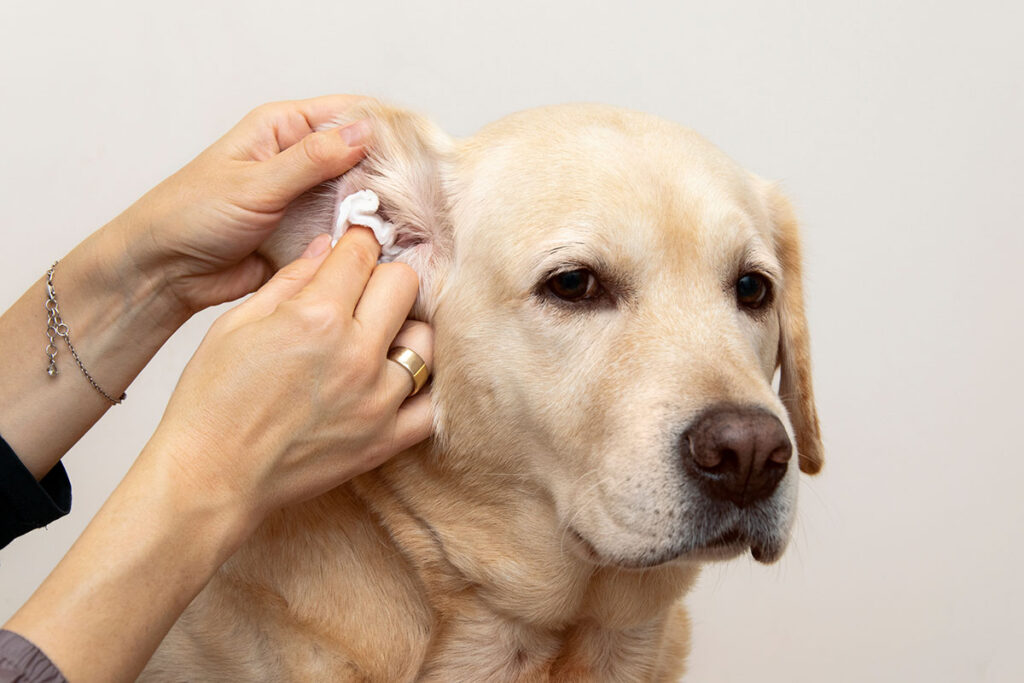If you’ve noticed your dog shaking its head more than usual or scratching at its ears, it might be dealing with an ear infection. This blog aims to provide you with clear, straightforward information on recognizing and managing dog ear infections. While home care can be a supportive measure, professional veterinary care is essential. If you’re concerned about your dog’s ear health, Montgomery Veterinary Associates is here to help. Learn more about symptoms, causes, and why prompt veterinary attention is necessary.
Symptoms of Ear Infections in Dogs
An ear infection in dogs can be uncomfortable and, if left untreated, can lead to more serious issues. Here are some common symptoms to watch out for:
- Persistent scratching or pawing at the ear
- Unusual head shaking or tilting
- Redness or swelling in the ear canal
- Unpleasant odor or discharge from the ear
- Visible discomfort or whining when the ear is touched
If you notice any of these signs, it’s time to seek professional help. Our team at Montgomery Veterinary Associates is ready to assist you.
Causes of Ear Infections in Dogs
Understanding what causes ear infections in dogs is a key step in prevention. Some common causes include:
- Bacteria or yeast overgrowth
- Allergies (food or environmental)
- Foreign bodies in the ear
- Ear mites
- Excessive moisture (often from swimming or bathing)
Each dog is unique, and the cause of ear infections can vary. That’s why it’s so important to get a professional diagnosis.
Seeking Veterinary Care
When it comes to your dog’s health, getting accurate and timely medical attention is paramount. At Montgomery Veterinary Associates, we use state-of-the-art equipment to diagnose and treat ear infections. Our experienced vets will examine your dog’s ear canal, take a sample for analysis if necessary, and recommend the best course of treatment. You can schedule an appointment online or call one of our locations for more information.
Treatment Options for Ear Infections
Treatment depends on the cause and severity of the infection. It may include:
- Medications (antibiotics or antifungal)
- Ear drops
- Cleaning agents
- Anti-inflammatory drugs
Remember, each dog’s needs are different, and only a vet can prescribe the right treatment. Self-treatment is not advised, as it can worsen the condition.
Preventing Ear Infections in Dogs
Preventing ear infections is a key part of caring for your dog. Here are some tips:
- Regular ear cleaning (ask your vet for recommendations)
- Keeping ears dry after baths or swimming
- Managing allergies through diet or medication
- Regular check-ups at Montgomery Veterinary Associates
When to Call the Vet
Some symptoms indicate that immediate veterinary care is needed:
- Severe pain or agitation
- Balance issues or disorientation
- Extreme redness or swelling
- Bloody or pus-like discharge
If you see these signs, contact Montgomery Veterinary Associates immediately.
Long-Term Management of Ear Health
Managing your dog’s ear health is an ongoing process. Regular vet check-ups, a healthy diet, and consistent ear care routines are key. At Montgomery Veterinary Associates, we are committed to supporting you in keeping your dog’s ears healthy. Schedule regular visits with us to ensure your dog’s ears are in top condition.
Conclusion
Ear infections in dogs can be distressing, but with proper care and attention, they are manageable. Being aware of the symptoms, understanding the causes, and seeking timely veterinary care are essential steps. At Montgomery Veterinary Associates, we are dedicated to helping you and your dog through this. Remember, early detection and treatment make all the difference. Don’t wait to seek help if you suspect your dog has an ear infection. Call us or visit our website to make an appointment and get the support your dog needs.






